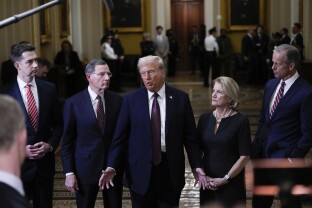President-elect Donald Trump may publicly be pushing for whatever reconciliation approach works — one bill or two — but, privately, Trump is still very much advocating for a single package.
Trump repeatedly made the case for one bill Wednesday night during a two-hour meeting with GOP senators, even as some senators themselves pushed back and made the case for two bills.
And even though Trump and Republican senators aren’t on the same page about the strategy, senators reading the room think they know where Congress will ultimately land.
“It could go either way, but I think the momentum seems to be towards one coming from the House,” Sen. Rand Paul told reporters after leaving the meeting.
Paul added that Trump is still open to a two-bill solution, which Trump confirmed during a brief press conference after the meeting, but he clearly prefers the single-measure approach.
“There’s great unity,” Trump told reporters after the meeting. “There’s a lot of talk about two, and there’s a lot of talk about one. But it doesn’t matter. The end result is the same.”
Part of the meeting was dedicated to advocates of the two-bill process discussing their approach. The advocates included Sens. Lindsey Graham and Ted Cruz, while Majority Leader John Thune also elaborated on the potential path.
“He prefers the one-bill approach, but, you know, he’s open to how we get this stuff done,” Sen. John Hoeven said. During the meeting, Hoeven spoke about a “horse race” between the two approaches to see which one comes together quicker.
“We had a lot of discussion on pluses and minuses of both,” he said.
After the meeting, Cruz told reporters that he remains a strong believer in pursuing two reconciliation packages.
“Why? Because that unifies Republicans,” Cruz said. He added that he “vigorously” expressed the importance of winning two major victories “rather than putting all the eggs in one basket and risking a very real risk of it not getting the votes to pass.”
Senators said Trump’s first meeting on Capitol Hill of 2025 operated like a listening session. Although Sen. Ron Johnson was clear that Trump “made a big pitch” for one bill, many senators described a productive and upbeat exchange. Sen. Tommy Tuberville estimated some 15 senators asked Trump questions ranging — as only Tuberville could put it — from “foreign relations” to “whatever.”
As for Thune’s latest thinking on reconciliation, Sen. Markwayne Mullin told reporters the majority leader “made it very clear that he’s going to do what the president wants us to do.”
Other than reconciliation, Sen. James Lankford told reporters that Trump opened the discussion with remarks about the wildfires in California. Earlier Wednesday, the incoming president blamed Gov. Gavin Newsom for lack of statewide preparedness — which Democrats aggressively dispute.
“He did talk about California and how horrible it is, quite frankly,” Lankford said. “He actually started with that he’s watching and tracking how terrible the fires are in California, not having access to water and their lack of preparation as a state.”
Lankford specified, however, that Trump and senators did not discuss any details about potential federal aid. Multiple senators said Trump did discuss Greenland, which the president-elect is interested in acquiring.
“He’s talked about all those things,” Lankford told NOTUS in response to a question about Greenland. “It was nothing different than what he’s talked about publicly.”
As open-minded as Trump seems on the best approach for reconciliation, Hoeven told reporters that senators are similarly going with the flow. “And we’ll see what develops,” Hoeven said.
“But we spent a lot less time on Greenland,” he added.
—
Ben T.N. Mause is a NOTUS reporter and an Allbritton Journalism Institute fellow. Riley Rogerson is a reporter at NOTUS.
Reese Gorman, who is a reporter at NOTUS, contributed to this report.
Sign in
Log into your free account with your email. Don’t have one?
Check your email for a one-time code.
We sent a 4-digit code to . Enter the pin to confirm your account.
New code will be available in 1:00
Let’s try this again.
We encountered an error with the passcode sent to . Please reenter your email.


